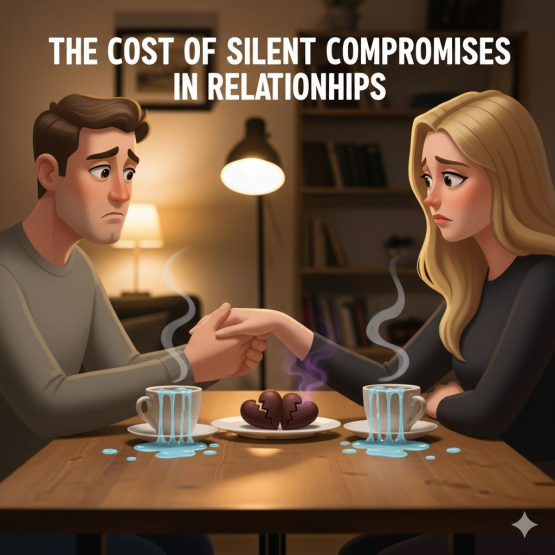
The Cost of Silent Compromises in Relationships
In every relationship, there are little moments when something bothers us — a hurtful comment, a forgotten promise, a dismissive tone. Often, instead of speaking up right away, we tell ourselves: It’s not a big deal. Let it go.
It feels like the mature thing to do — to keep the peace, to not make an issue out of small things. But psychology shows us that avoiding these conversations doesn’t make problems disappear. It only buries them — until one day, they erupt.
Why We Stay Silent
There are many reasons we ignore or avoid uncomfortable moments:
- Fear of conflict: We don’t want to start a fight.
- Minimizing feelings: We convince ourselves it’s too small to bring up.
- People-pleasing: We don’t want to look demanding or needy.
- Hope it will change on its own: We assume our partner will figure it out.
But silence has a cost. Every time we suppress a feeling, it adds a small brick to the wall between us and our partner.
The Psychology of Suppression
Psychologists call this emotional suppression — choosing not to express a feeling. While it may temporarily avoid conflict, research shows suppression leads to:
- Increased stress and resentment. The body holds on to tension when emotions are unexpressed.
- Reduced intimacy. If you can’t be honest, the bond becomes shallow.
- Emotional “leakage.” The suppressed feelings eventually come out — not calmly, but as anger, sarcasm, or explosive fights.
This is why a small ignored irritation today can turn into an outsized argument tomorrow.
Why Communicating Early Matters
Think of small irritations like tiny sparks. If you put them out early with open conversation, they don’t do harm. But if ignored, they can turn into a fire that damages trust and safety in the relationship.
Communicating in the moment (or soon after) has powerful benefits:
- Prevents resentment from building up.
- Creates a culture of honesty and safety.
- Helps your partner actually understand you — rather than being blindsided later.
- Strengthens intimacy by showing vulnerability.
How to Speak Without Starting a War
The key is how you communicate. Instead of waiting until anger boils over, try:
- Use “I” statements:“I felt hurt when that joke was made,” instead of “You always make fun of me.”
- Keep it specific and timely. Don’t store grievances for weeks. Address them when they happen.
- Stay calm, not accusatory. The goal is to be understood, not to win.
- Balance with appreciation. Remind your partner what they do right, too.
The Long-Term Payoff
Healthy relationships are not built on avoiding discomfort; they are built on handling it with care. Communicating early is not about being confrontational — it’s about being honest, respectful, and invested in long-term harmony.
So the next time you’re tempted to brush something off, ask yourself: Am I letting this go for real, or am I just postponing the explosion?
Because sometimes, the kindest thing you can do for your relationship is to speak up — not later, but now.
Silence may keep the peace today, but honesty builds the love that lasts.